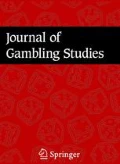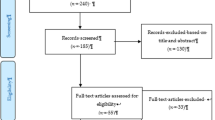Abstract
In October 2008 all three major banks in Iceland went bankrupt with serious consequences for Icelandic society. The national currency lost more than half of its value and there was a sharp increase in household debts and prices for domestic goods. Very little is known about the potential effects of economic recessions on gambling participation and problem gambling. This study reports on the results of three national prevalence studies conducted before and after the economic collapse in Iceland. The same methodology and measures were used in all three studies to ensure their comparability and the studies included in total N = 8.249 participants. There was an increase in past year gambling participation which extended across most gambling types. Only participation on EGMs declined significantly after the economic collapse. Past year prevalence of problematic gambling increased but further examination revealed that this increase is most probably explained by an increase in card and internet gambling among young men. Moreover, those who experienced financial difficulties due to the economic recession were 52 % more likely to have bought a lottery ticket during the recession compared to those who were not affected financially. Overall, the results indicate that serious national economic recessions have differential effects on gambling behavior.
Similar content being viewed by others
Notes
Initially the variables residence and unemployment status were also considered as potential predictor variables. However, an exploratory analysis revealed no significant effects for unemployment and only few (rather weak) effects for residence. These variables were therefore not included in the statistical analysis.
References
Abbott, M. W. (2006). Do EGMs and problem gambling go together like a horse and carriage? Gambling Research, 18(1), 7–38.
Abbott, M. W. (2007). Situational factors that affect gambling behavior. In G. Smith, D. C. Hodgins, & R. J. Williams (Eds.), Research and measurement issues in gambling studies (pp. 251–278). London: Elsevier.
Abbott, M. W., Romild, U., & Volberg, R. A. (2013). Gambling and problem gambling in Sweden: Changes between 1998 and 2009. Journal of Gambling Studies. doi:10.1007/s10899-013-9396-3.
Adams, P. J., Raeburn, J., & de Silva, K. (2009). A question of balance: Prioritizing public health responses to harm from gambling. Addiction, 104, 688–691.
Ariyabuddhiphongs, V. (2011). Lottery gambling: A review. Journal of Gambling Studies, 27, 15–33.
Bakken, I. J., Götestam, K. G., Grawe, R. W., Wenzel, H. G., & Øren, A. (2009). Gambling behavior and gambling problems in Norway 2007. Scandinavian Journal of Psychology, 50, 333–339.
Bakken, I. J., & Weggeberg, H. (2008). Pengespill og Pengespillproblemer i Norge 2008 [Gambling and problem gambling in Norway 2008]. Report no. A8499. Oslo: SINTEF.
Benediktsdottir, S., Danielsson, J., & Zoega, G. (2011). Lessons from a collapse of a financial system. Economic Policy, 26(66), 183–235.
Bergman, E. (2014). Iceland and the international financial crisis: Boom, bust and recovery. New York: Palgrave Macmillan.
Cox, B. J., Yu, N., Afifi, T. O., & Ladouceur, R. (2005). A national survey of gambling problems in Canada. Canadian Journal of Psychiatry, 50(4), 213–217.
Delfabbro, P., & King, D. (2012). Gambling in Australia: Experiences, problems, research and policy. Addiction, 107, 1556–1561.
Derevensky, J. L. (2009). Foreword. In G. Meyer, T. Hayer, & M. Griffiths (Eds.), Problem gambling in Europe: Challenges, prevention, and intervention (pp. xv–xviii). New York: Springer.
Derevensky, J. L. (2012). Teen gambling: Understanding a growing epidemic. Plymouth: Rowman & Littlefield Publishers.
Ferris, J., & Wynne, H. (2001). The Canadian problem gambling index: Final report. Ottawa: Canadian Centre on Substance Abuse.
Griffiths, M., Hayer, T., & Meyer, G. (2009). Problem gambling: A European perspective. In G. Meyer, T. Hayer, & M. Griffiths (Eds.), Problem gambling in Europe: Challenges, prevention, and intervention (pp. xix–xxix). New York: Springer.
Gudmundsdottir, D. G. (2013). The impact of economic crisis on happiness. Social Indicators Research, 110, 1083–1101.
Holtgraves, T. (2009). Evaluating the problem gambling severity index. Journal of Gambling Studies, 25, 105–120.
Horváth, C., & Paap, R. (2012). The effect of recessions on gambling expenditures. Journal of Gambling Studies, 28, 703–717.
Johnsen, G. (2014). Bringing down the banking system: Lessons from Iceland. New York: Palgrave Macmillan.
Kun, B., Balázs, H., Arnold, P., Paksi, B., & Demetrovics, Z. (2012). Gambling in Western and Eastern Europe: The example of Hungary. Journal of Gambling Studies, 28, 27–46.
LaPlante, D. A., & Shaffer, H. J. (2007). Understanding the influence of gambling opportunities: Expanding exposure models to include adaptation. American Journal of Orthopsychiatry, 77(4), 616–623.
Loo, J. M. Y., Oei, T. P. S., & Raylu, N. (2011). Psychometric evaluation of the problem gambling severity index-Chinese version (PGSI-C). Journal of Gambling Studies, 27, 453–466.
Lyons, C. A. (2013). Gambling in the public marketplace: Adaptions to economic context. The Psychological Record, 63, 309–322.
National Institute for Health and Welfare (2013). Yearbook of gambling in Finland 2012. Helsinki: National Institute for Health and Welfare.
Olason, D.T., Finnbogadottir, H., Hauksdottir, M. A. & Barudottir, S. K. (2003). An Icelandic version of the problem gambling severity index: A psychometric evaluation. Paper presented at the 27th Nordic Psychiatric Congress, Reykjavik, Iceland.
Olason, D. T., & Gretarsson, S. J. (2009). Iceland. In G. Meyer, T. Hayer, & M. Griffiths (Eds.), Problem gambling in Europe: Challenges, prevention, and intervention (pp. 137–152). New York: Springer.
Orford, J. (2005). Disabling the public interest: Gambling strategies and policies for Britain. Addiction, 100, 1219–1225.
Orford, J. (2012). Gambling in Britain: The application of restraint erosion theory. Addiction, 107, 2082–2086.
Reith, G. (2007). Situating gambling studies. In G. Smith, D. C. Hodgins, & R. J. Williams (Eds.), Research and measurement issues in gambling studies (pp. 3–24). London: Elsevier.
Schwartz, D. G. (2006). Roll the bones: The history of gambling. New York: Gotham Books.
Shaffer, H. J., & Hall, M. N. (2001). Updating and refining prevalence estimates of disordered gambling behavior in the United States and Canada. Canadian Journal of Public Health, 92(3), 168–172.
Sharp, C., Steinberg, L., Yaroslavsky, I., Hofmeyr, A., Dellis, A., Ross, D., & Kincaid, H. (2012). An item response theory analysis of the problem gambling severity Index. Assessment, 19(2), 167–175.
Special Investigation Commission (SIC). (2010). Background and causes of the collapse of the Icelandic banks in 2008 and related events. Report of the Special Investigation Commission. Reykjavík: Special Investigation Commission.
Statistics Iceland. (2011). Verðlag og neysla [Prices and consumption]. Reykjavík: Statistics Iceland.
Statistics Iceland. (2012). Skráðir nemendur í framhalds og háskólum haustið 2011 [Registered students at the upper secondary and tertiary level in autumn 2011]. Reykjavík: Statistics Iceland.
Stucki, S., & Rihs-Middel, M. (2007). Prevalence of adult problem and pathological gambling between 2000 and 2005: An update. Journal of Gambling Studies, 23, 245–257.
Wardle, H., Griffiths, M. D., Orford, J., Moody, A., & Volberg, R. (2012). Gambling in Britain: A time of change? Health implications from the British gambling prevalence survey 2010. International Journal of Mental Health Addiction, 10, 273–277.
Welte, J. W., Barnes, G. M., Tidwell, M., Hoffman, J. H., & Wieczorek, W. F. (2014). Gambling and problem gambling in the United States: Changes between 1999 and 2013. Journal of Gambling Studies. doi:10.1007/s10899-014-9471-4.
Williams, R.J., Volberg, R.A. & Stevens, R.M.G. (2012). The population prevalence of problem gambling: Methodological influences, standardized rates, jurisdictional differences, and worldwide trends. Report prepared for the Ontario Problem Gambling Research Centre and the Ontario Ministry of Health and Long Term Care. 8 May 2012.
Acknowledgments
This research project received funding from the University Lottery, Rannis-The Icelandic Centre for Research and the Ministry of the Interior. The authors have full responsibility for all parts of the data collection, examination of the data and full control over the decision on publication.
Author information
Authors and Affiliations
Corresponding author
Rights and permissions
About this article
Cite this article
Olason, D.T., Hayer, T., Brosowski, T. et al. Gambling in the Mist of Economic Crisis: Results From Three National Prevalence Studies From Iceland. J Gambl Stud 31, 759–774 (2015). https://doi.org/10.1007/s10899-015-9523-4
Published:
Issue Date:
DOI: https://doi.org/10.1007/s10899-015-9523-4



